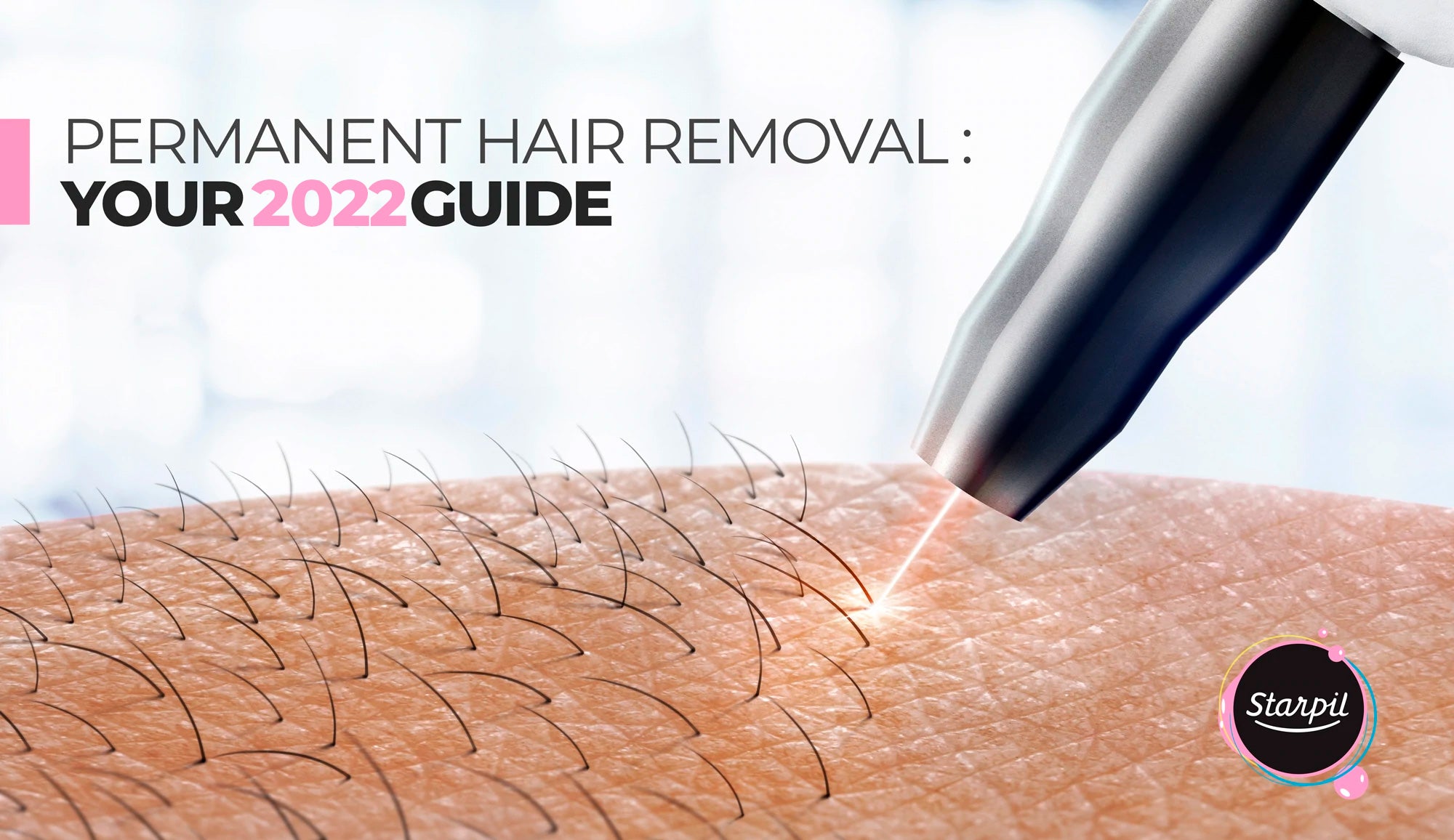Permanent Hair Removal: Your 2022 Guide

If you're in the hair removal business, and a proud waxing professional, you cannot turn a blind eye to other ways to get rid of hair. Knowing the ins, outs and differences between permanent hair removal methods and semi-permanent modalities is in every hair removal expert's best interest. There are many things to consider when choosing a hair removal treatment like waxing, sugaring, threading, laser, electrolysis, or IPL. Of course, we don’t want to lose our waxing clients to laser hair removal, for example. Still, we need to look out for their best interests, and the more we know, the more we can help ensure their safety and help them make the right choice when approached with questions concerning how to remove hair permanently.
In this article, we’re breaking down different permanent hair removal options and discussing their differences, the pros and cons, and why, in the end, someone would still choose waxing over anything else.
Can hair be removed permanently?
Let’s cut to the chase; no hair removal treatment can permanently remove hair with a 100% guarantee. But yes, many “permanent” modalities can reduce hair growth, dull its ability to return, and keep it from coming back for weeks, months, or more extended periods.
For the sake of this conversation, we may refer to methods like laser, IPL, and electrolysis as permanent hair removal or permanent hair reduction, but in reality, they’re semi-permanent. The truth is, a lot of hair growth is based on hormones. If hormonal balance changes, it can stimulate hair follicles to produce new hair growth. So, when a client asks about how to remove hair permanently, you can let them know this right off the bat.
How much does it cost to remove body hair permanently?
Permanent hair reduction relies on multiple factors such as hair and skin types, the rate at which hair grows, and the area of removal. The average cost for permanent hair removal is around $200 per session. Because of the various skin and hair factors, multiple sessions may be needed or even fewer than three. Most hair growth reduction takes anywhere from six to 12 sessions, creating total prices upward of a thousand dollars.
What is the best permanent hair removal?
The three most popular permanent hair removal methods are laser, IPL, and electrolysis. But just because they’re in demand doesn’t mean any of them are the best way to permanently remove hair. Each modality favors different skin and hair types, time factors, and budgets over the other. Let’s break them all down so that you can see, in the end, how your clients may still benefit from waxing over these options.
LEARN MORE: HOW TO GET SMOOTH SKIN THAT LASTS: A COMPLETE GUIDE
Laser Hair Removal

Laser hair removal is a popular method of permanent hair removal. In the past, laser’s effectiveness was limited to those with pale skin and dark hair. Its abilities extended to other skin and hair types and other areas of the body as it evolved. Despite its evolution, it needs to catch hairs in its growth phase for it to be effective. That’s why multiple treatments are required; not all of your hairs are in grow mode in a single session.
Laser hair removal can take as little as four to six sessions but potentially take eight to twelve sessions to catch and deplete hair in its growth stage in any given area completely. Usually, sessions are spaced out in one-month to six-week appointments making many peoples’ commitments last close to a year.
How permanent is laser hair removal?

Laser hair removal is a medical procedure that involves a machine that delivers a concentrated beam of light into hair pigment. The light generates heat that destroys the hair follicle from within without significantly harming the surrounding tissue. This process may result in permanent hair removal if the follicles are completely destroyed. This isn't guaranteed, and multiple sessions are needed for even the initial, “complete” hair removal. Even after your core treatments are finished, maintenance treatments might still be required.
How painful is laser hair removal?
Laser hair removal is only as painful as a client’s tolerance. Many compare laser to the sensation of tiny rubber bands snapping on the skin. The potential pain doesn’t seem to deter people from getting the treatment because it is a wildly popular method and generally, many that get it stand by their choice.
Pain levels can fluctuate depending on where the hair removal treatment is being given, like on the underarms or bikini line. Your pain tolerance and skin structure also play a role. Some treatment centers may provide a local anesthetic, strong numbing creams, or cooling devices attached to their devices.
Can you wax between laser treatments?
When one first starts laser hair removal, they will see recurring growth from the hairs that were not in the growth phase upon treatment. But since the hair removal treatment targets the hair roots’ pigments to damage the follicle, it needs those roots! If you turn to semi-permanent hair removal options like waxing, sugaring, threading, or tweezing between permanent hair removal treatments, you’re wasting precious root resources. Shaving is the best option over waxing after laser hair removal sessions.
How quickly does hair grow back?
For laser to be effective, it needs to destroy the follicle. When the follicle is merely damaged, hair growth will return. Also, laser can’t target hair in its resting or shedding phase, and it eventually regrows within a few months.
Does laser hair removal work on dark skin?
The first laser hair removal treatments introduced decades ago were not created with melanin and darker skin tones in mind. With that being said, laser treatments used to be safer for people with fair skin and dark hair follicles. However, there have been many advancements in laser hair removal for dark skin over recent years and this treatment has since become a popular hair removal method for individuals of all skin tones.
Check out this video by Dr. Simi Adedeji, where she dives deeper into this topic.
LEARN MORE: A STARPIL WAX GUIDE TO HAIR GROWTH
IPL (Intense Pulsed Light)

IPL can be considered similar to laser hair removal because it uses light to target and kill hair roots. IPL, however, is not a laser treatment. IPL uses broad-spectrum light at multiple wavelengths to heat and destroy hair follicles. Some would argue that because it uses more light wavelengths, IPL would be more effective than laser, but in truth, all of the light wavelengths don’t target hair. Unlike laser, IPL is less concentrated, more diffused, and weaker than laser for hair removal. According to an article by Harper’s Bazaar UK, skin specialist Lucy Xiu explains the science behind IPL.
"Spectrum lights are measured as wavelength (nm), for example, 755nm wavelength means this spectrum light can penetrate 755nm deep beneath the skin. 755nm wavelength light is best attracted to melanin, so it is best used for hair removal. 532nm means light can reach up to 532nm beneath the skin"
Essentially, IPL is a beautiful method for skin renewal treatments on fine lines, age spots, sun-induced freckles, acne, rosacea, and broken capillaries, but not hair removal when compared to other permanent body hair removal methods.
Who is an ideal candidate for IPL?
Because IPL targets melanin in hair, results are best for those with pale to medium skin tones and dark hair. Darker skin types can absorb the light waves before it reaches the hair root, which can cause more skin irritation or discoloration that can last from days to months. Both light and skin tones are prone to these side effects, but it is more common on darker skin.
How painful is IPL hair removal?
Both laser and IPL hair removal can hurt. But again, pain levels are determinant of individual skin structures and pain tolerance. Pain can be stronger in sensitive areas like the underarms or bikini line vs. the arms or back. All in all, because IPL isn’t as concentrated as laser hair removal, it can hurt less.
LEARN MORE: WHAT IS A HISTAMINE REACTION AFTER WAXING?
How many sessions do you need for IPL hair removal?
The number of IPL hair removal treatments can vary based on each individual’s hair and skin type and the area being treated, so results may vary. The average number of IPL treatments is about 6-8 sessions or more. The average treatment number on underarms is around six sessions, and for the bikini line, eight.
Electrolysis

Unlike laser or IPL hair removal, electrolysis uses electricity instead of light. It involves inserting a probe deep into the hair follicle and delivering tiny pulses of an electric current as little as one-thousandth of a second in length to kill the follicle. This is a breakthrough in permanent hair removal because it does not rely on hair pigment to destroy the follicle. This means that electrolysis can be effective on most skin and hair types.
Is electrolysis better than laser?
In a medically reviewed 2018 Healthline article, it was clear that electrolysis had more advantages than laser hair removal.
“Laser therapy and electrolysis both produce longer-lasting effects compared to shaving. But electrolysis seems to work the best. The results are more permanent. Electrolysis also carries fewer risks and side effects, and you don’t need the maintenance treatments required for laser hair removal”
-Healthline
How long is an electrolysis treatment?
Like laser and IPL, the number of treatments and the length of each service depends on the size of the area of treatment. Electrolysis sessions usually take up to 45 minutes, but touch-up sessions can be as quick as 15-20 minutes in the clinic.
How permanent is electrolysis?
The numbers on electrolysis aren’t anything to shake a stick at, but again, no “permanent” hair removal is truly permanent. According to a study in the Journal of the American Academy of Dermatology, electrolysis has approximately a 93 percent success rate. That’s a strong number, but not everyone responds well to the treatment. Just like with any hair removal treatment, the best results come from working with a certified professional.
What are the side effects of electrolysis?
The most common side effects experienced after an electrolysis treatment are tenderness, redness, inflammation, and swelling. These side effects should only last for around 24 hours. Electrolysis can also leave one with small spots or blood scabs which may appear a couple of days after your session. These are all common occurrences. Skin takes about 7-21 days to heal after the service entirely.
LEARN MORE: DONT GO TO THE WAX SALON WITHOUT THESE TIPS
PERMANENT HAIR REMOVAL VS. SEMI PERMANENT HAIR REMOVAL
OK, so we’ve gone on at length about these long-lasting hair removal treatments. Do they sound so wonderful that you might be afraid all of your clients might switch to one of them over waxing? Let’s relieve any of those fears by sharing this: The means don’t always justify the end. We mean that the methods, time, cost, and commitment of permanent hair removal won’t be worth it to everyone. Also, these treatments aren’t your competition—everything is, and we’re not worried about someone spending their time and money at Sephora or the movies instead of with us, so have no fear about clients wanting to turn to these other hair removal treatments.
We’re still going to discuss the differences between the two categories to know the value of what you do and how to respond with information when asked which method is best.
Different Semi-Permanent Methods
There are many forms of hair removal that don’t require such invasive treatments. As many may know, there are waxing, sugaring, threading, tweezing, and depilatory creams. Waxing, tweezing, and threading all remove hair from the root, while shaving and hair removal creams only “cut” hair off at the surface level.
Waxing and Sugaring
Two of the most effective methods of semi-permanent hair removal are waxing and sugaring. These methods are often put together because they both can remove large areas of hair from the root at once. Waxing can cover larger areas of hair at once, more so than sugaring). Sugaring is often considered an “all-natural” approach, while waxing (if you’re using the best formula) can be hypoallergenic and offer multiple formulas that cater to a specific skin type while exfoliating the skin.
Sugaring can be touted as a clean method, but it’s up to the consumer to determine if their practitioner is using an all-natural formula. Both ways can reduce hair growth. Waxing, and sugaring are considerably less invasive than “permanent” hair removal modalities. Though both methods have their precautions, they are topical solutions and don’t penetrate beneath the surface to remove hair. Clients need to only work with the best waxing or sugaring specialists.
Browse our hard wax collection to discover the products that waxing specialists and estheticians trust the most.
LEARN MORE: HOW TO USE HARD WAX LIKE A PRO
Threading

Another popular form of hair removal is threading. Imagine twisting up a rubber band, laying it out across the skin, and rolling it along the surface; all of the hair in its path will roll along. This method is mostly used on the face and is considered more painful than waxing or sugaring because it’s removed in rows and not in areas. Threading can be done on other areas of the body but would be extremely painful. The plus side of threading is it’s all-natural, but again, it can be extremely painful.
Tweezing

Tweezing is mostly done on the eyebrows. Usually, tweezing is done by those who know exactly what they’re doing. The benefits of tweezing are that hair is removed out from the root in the direction of the hair growth and not in the opposite direction. The nature of tweezing does not allow for large areas of thick hair to be removed from the body; that’s why it’s predominantly done on the eyebrows. Unlike waxing or sugaring, it’s less damaging to the follicle, and therefore, hair growth is a mainstay.

FINAL THOUGHTS
Permanent hair removal is an advancement in technology; there’s no questioning that. However, it is not the answer for everyone. Its upfront yearly costs are considerably higher than semi-permanent methods like waxing. Laser, IPL, and Electrolysis also take a strong commitment that added with the costs, might not seem worth it. Each permanent hair removal method has varying precautions that leave room for people to say no thank you. But, if you do find clients wanting to pursue permanent hair removal, wish them well and appreciate the space for those looking for what it is you have to offer.
JOIN THE #STARPILFAM
- To get The Waxopolitan in your inbox, subscribe here for all the fun!
- Get all the Starpil hook-ups with Starpil Esthie Bucks for rewards on your favorite waxing products.
- Join other professional #starpilfam members in The World of Waxing, our Facebook Group. (Have your license ready).
- Follow us on Instagram @starpilwaxUSA for all of the up-to-the-minute waxing trends, Starpil news, and earn free Esthie Bucks.
- Call us at +1 305 907-0756 or text us at Text: (786) 315-9470 from 9:30 AM - 5:30 PM EST.
- Or email us at info@starpilwax.com and put PAM REQUEST in the subject line or contact us here.







Comentarios